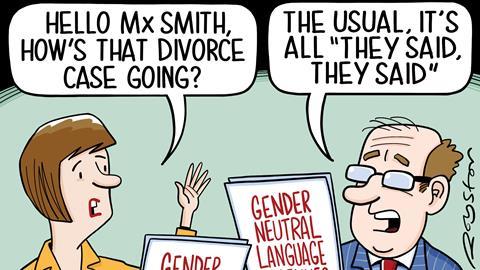By writing ‘Dear Sirs’, some lawyers feel they are holding out against political correctness. But the battle against gender-neutral language is surely a losing cause, reports Melanie Newman
It is more than a decade since former home secretary Jack Straw announced future laws would be gender-neutral. Use of male pronouns to apply to both sexes was potentially confusing, he argued, and could be seen as reinforcing gender stereotypes. Words such as ‘chairman’ were too often used for offices open to either sex and should be outlawed, he added.
Straw’s plans were not well received by then MP for Maidstone and the Weald, Ann Widdecombe, who retorted: ‘A chair is a piece of furniture… all he is doing is distorting the English language, and I would have thought he had better things to do.’
An internet search pulls up 1.5m hits for the word ‘chairman’ on .gov.uk websites – mainly in local government – compared with 2.25m ‘chairs’. Some of Straw’s intended audience clearly also feel they have ‘better things to do’ than worry about gender-neutral language.
That undoubtedly remains the view in the dustier parts of the legal profession. Elsewhere things are starting to change, though the pace is slow.
It was not until 2016 that the first of the magic circle law firms banned the salutation ‘Dear Sirs’ from its legal documents and communications. Freshfields Bruckhaus Deringer would now use ‘Dear Sir or Madam’ in UK correspondence and ‘Dear Ladies and Gentlemen’ in the US, it said, with equivalents in other languages used in the firm’s international offices.
While Freshfields tells the Gazette the initiative was ‘very well received’, it was not without its critics, including those who saw it as paying lip service to equality at a time when less than 20% of the firm’s partners were female. The use of the singular ‘Dear Sir or Madam’ to address an organisation also raised eyebrows. Not to mention the fact Freshfields staff are not all signed up to the new ways, if documents filed with the US Securities and Exchange Commission in the last two years are anything to go by (17 December 2017 and 9 March 2018).
What’s in a name?

When Lady Butler-Sloss (pictured) was first made a lord justice of appeal, she was a lord justice until 1994. In that year the master of the rolls directed that she should be known informally as lady justice and addressed as ‘my lady’, notes Baker McKenzie’s Harry Small.
The Courts Act 2003 changed the title to be either ‘lord justice’ or ‘lady justice’. ‘The same Act (s64) now empowers the lord chancellor to change the title and mode of address of most judicial office-holders from lord chief justice down and including masters,’ says Small.
But are there titles that cannot be changed? Does, for example, the constitution demand that it is always ‘lord chancellor’?
‘The lord chancellor cannot change their own designation under the 2003 act mentioned above,’ says Small. ‘But there are no “no-go areas” in the British constitution: the constitution is what parliament says it is. And parliament could very easily change the lord chancellor’s title to remove a gender-specific term, just as it did for lords justices of appeal.’
Harry Small, a partner at Baker McKenzie, says: ‘We do not recommend the use of “Ladies and Gentlemen” because it implies that gender is binary.’ Instead, his firm would start a letter to Freshfields ‘Dear Freshfields’.
Of the letters coming into Cartridges Law, where Bridget Garrood is a consulting partner, 99% still commence ‘Dear Sirs’, although for several years the firm’s partners have all been female. ‘The very occasional letter is addressed “Mesdames” which is quaint and nicely European in these difficult times, but hardly suitable for the 21st century,’ she says. She prefers her firm to be addressed as: ‘Dear Cartridges Law’, ‘Dear Solicitors’ or ‘Dear Lawyers’.

All staff should be trained never to assume the gender of a person’s partner until they have used a gender pronoun from which a cue can be taken, she adds.
‘This is particularly important when their relationship is at the centre of their enquiry, for example when they ring solicitors for advice about a separation.’
Garrood, a member of the LGBT+ lawyers division of the Law Society, has heard multiple anecdotal reports of people ringing solicitors firms who have been automatically assumed to have a partner of the opposite sex.
‘LGBT+ people, myself included, can find this pretty uncomfortable,’ she explains. ‘It means you have to decide, often in your very first seconds of contact with a business, whether or not you are prepared to “out” yourself.’
Garrood recommends keeping language as gender-neutral as possible, in document drafting and in the firm generally.
‘The lazy and insulting – to me – use of “he” to include both genders as is the “convention” simply perpetuates unconscious bias in a very obvious way,’ she says. ‘This is a throwback, presumably, to when people in business entering contracts were all males. Certainly the people drafting the contracts were all male until women were permitted to join the professions [from] 1919.’
She goes so far as to say lawyers should reject documents presented to them for signature if the traditional masculinised approach has been used.
A question of ‘they’
The Office of the Parliamentary Counsel offers drafting guidance including three techniques for avoiding gender-specific pronouns. The guidance discusses the use of ‘they’ to replace ‘he’ or ‘she’ as a singular pronoun – a grammatical matter that has become somewhat controversial, as awareness of gendered language has entered the mainstream.
Back in 2013 Lord Scott of Foscote, a former Appeal Court judge and Vice-Chancellor of the Supreme Court, launched a lengthy attack on the government’s suggestion that ‘they’ be used in this manner.
In a House of Lords debate that year he cited examples of ‘appalling drafting’ such as ‘the claimant or their partner is a person’, and ‘an adult who is not the claimant’s partner if they are part of the claimant’s Extended Benefit Unit’.
Arguing that ‘he’ and ‘she’ should be used interchangeably rather than replaced, he added: ‘Statutes and statutory instruments ought not only to be clear and free of ambiguity, but surely ought also to stand as models for the correct use of the English language… to prostitute the English language in pursuit of some goal of gender equality is, I suggest, unacceptable.’
However, the Oxford English Dictionary recognises the long-established use of ‘they’ as a singular pronoun, and historical documents show it has been used in this way for centuries.
Are there any circumstances where the change to gender-neutral could make a clause too ambiguous? Not if it is drafted correctly, says Iain Drummond, partner at Shepherd and Wedderburn LLP.

‘The challenge for any drafter is to ensure that the meaning of a clause or term is clear and unambiguous, and in my view, the use of gender-neutral language should not make this task any more or less difficult,’ he says.
He points to the NEC Contracts, a suite of standard contracts widely used within the construction industry. In the most recent suite released in 2017, NEC4, each contract within the suite was amended to only use gender-neutral language, rather than male pronouns.
For example, Clause 11.2 of the NEC3 Engineering and Construction Contract reads:
(2) Completion is when the Contractor has
• done all the work which the Works Information states he is to do by the Completion Date…
Clause 11.2 in the updated NEC4 Engineering and Construction Contract reads:
(2) Completion is when the Contractor has
• done all the work which the Scope states is to be done by the Completion Date…
A further example can be found at Clause 13.4. NEC3 ECC contains the wording:
13.4 The Project Manager replies to a communication submitted or resubmitted to him by the Contractor for acceptance. If his reply is not acceptance, the Project Manager states his reasons…
Clause 13.4 of NEC4 updated this to:
13.4 The Project Manager replies to a communication submitted or resubmitted by the Contractor for acceptance. If the reply is not acceptance, the Project Manager states the reasons…
‘There was no need for the use of “him” “he” and “his” in NEC3, which makes an assumption that the relevant person – the contractor or project manager – is male,’ says Drummond. ‘The updated wording in NEC4 is straightforward, and does not alter the meaning of either of these clauses.’
Professional support lawyer Rachel Farr, whose firm Taylor Wessing is receiving increasing numbers of enquiries about gender-neutral documents, also thinks gender-neutral language is not imprecise.
‘It would be perfectly possible to have a contract which referred to both parties as “he” and it would be unclear to which it referred,’ she says. ‘To turn the point around, using gender should not be a defence to sloppy drafting!’
She concedes, however, that simple substitutions of singular pronouns could cause confusion: ‘You may need to repeat the name of the party or the defined term if there is any doubt or to emphasise that both the parties to the contract are entitled to do something.’
Client requests for gender-neutral documents sometimes turn out on further enquiry to mean ‘gender-specific’, she adds. Others truly mean gender-neutral, often because they want template documents that can be applied to the whole workforce with minimal amendments.
When dealing with individuals, establishing their personal preference is key, advises Farr: ‘If you want to be inclusive, you must take account of the individual’s views.’
Sarah Austin of Austins Solicitors agrees. ‘You should know your client well enough to make them comfortable to indicate a preference if it is not obvious.’
Rachel Reese, whose company Global Butterflies advises law firms on how to become more transgender-inclusive, says a large proportion of the generations born after 1981 do not see gender as a binary concept, but as ‘fluid’.
‘We are getting statistics from the US that suggest 12% of the workforce is non-binary,’ she says. ‘So if you are using unnecessarily gendered language you are going to be upsetting a large chunk of your workforce.’
Accepting transpeople
Global Butterflies advises law firms on use of titles by receptionists and other staff, recommending an end to gendered forms of address such as ‘sir’ and ‘madam’.
‘You’ve got people looking at someone and saying “hello sir”. That’s going to upset someone who is trans or non-binary so why not just ask for their name and use that?’ But some law firms have ‘kicked back’ on that.
‘It’s usually an older employee who says they like using “sir” and “madam”. I say “OK, but if 4% of the UK population is trans you may not hit the marker correctly and upset someone”.’
Some firms have added the title ‘Mx’ to their systems to recognise people who do not wish to be identified by a particular gender. In 2017 HSBC announced it was offering customers a choice of nine titles, including ‘M’, ‘Misc’, an abbreviation of miscellaneous, and ‘Mre’, which stands for ‘mystery’.
In practice making these kinds of changes can be difficult, Reese says.
‘What we’re finding is that a lot of systems are not very customisable. They only let you put one field in. So some firms are saying let’s not bother with titles at all – they get rid of them altogether. And that fits with a trend we’re seeing among audiences when we do our training. People do not tend to use titles, or want them.’
It sounds simple. But the rapid social changes surrounding individual gender identities may soon force firms to deal with far knottier issues.
GOVERNMENT GUIDANCE
The Office of the Parliamentary Counsel’s drafting guidance includes three techniques for avoiding gender-specific pronouns:
Repeat the noun or substitute it with a letter:
‘Earnings, in relation to a person, means sums payable to the person in connection with the person’s employment.’
‘If a person (“P”) who is registered in respect of a regulated activity carries on that activity while P’s registration is suspended, P is guilty of an offence.’
Change the pronoun including by turning it into a plural:
‘Participants may only carry on the regulated activities if they hold a permit.’
Rephrase to avoid the need for a pronoun or noun altogether:
‘Immediately before death’, rather than ‘immediately before his death’.
‘Dropping litter is an offence’, rather than ‘A person commits an offence if he drops litter’.
‘A person who practises without a permit commits an offence’, rather than ‘A person commits an offence if he practises without a permit’.
A case involving a transgender man who gave birth and wants to be registered as the father on the birth certificate is currently being heard in the High Court. The Register General’s present position is that any transgender man who gives birth – even someone legally recognised as male – must be registered as the child’s mother.
Irrespective of what happens in the case Reese says there is likely to be a move away from the language of ‘mother’ and ‘father’ in parental leave policies and other documents towards, for example, ‘person carrying the child’ and ‘person not carrying the child’.
‘The gendered terms “mother” and “father” may not make any sense any more.’
But while amending a policy may seem straightforward, there are implications of decoupling certain terms from the sex with which they have traditionally been associated. What happens if the transgender man who gives birth feels discriminated against as a result of the pregnancy?
‘It’s very complicated. The law is going to have to catch up,’ says Reese.
Meanwhile debates currently raging online about when and whether a person’s biological sex, rather than their gender, should be considered relevant are already spilling into the legal profession.
The Solicitors Regulation Authority has come under fire for not specifically asking practitioners to specify their sex in a survey of the profession’s diversity. Solicitors pointed out on social media that sex is one of the protected characteristics stipulated by the Equality Act 2010 and that failing to collect this data would make it more difficult to determine whether firms are discriminating on this ground, or to compare with previous years.
Gender pay reporting legislation requires larger employers to publish annual calculations showing the pay gap between ‘men’ and ‘women’ on their staff. But these terms are not defined, leaving firms to decide how – and if – to apply them to staff who define as non-binary or are trans, but do not have a gender-recognition certificate.
‘It would be pretty crude if a law firm said you are technically male, so we’ll just tick that. It would be very unkind,’ says Reese. ‘The problem is there is no rulebook on this.’
The contrary argument is that discrimination on the basis of biology occurs regardless of gender identity and that obscuring data on sex would do a disservice to a larger number of female staff.
As lawyers and their clients get to grips with this fast-changing world they may start longing for the days when the use of ‘they’ as a singular pronoun was controversial.
Melanie Newman is a freelance journalist
































9 Readers' comments